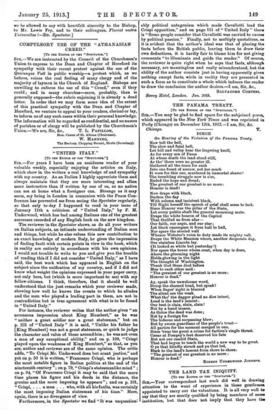" UNITED ITALY."
[To THE EDITOR OF THE "SPECTATOR.1 Sin,—For years I have been an assiduous reader of your valuable weekly, especially enjoying the articles on Italy, which show in the writers a real knowledge of and sympathy with my country. As an Italian I highly appreciate them and always maintain that they are more interesting and often more instructive than if written by one of us, as no native can see at home what a foreigner can. Strange as it may seem, my being in London in connexion with the Peace Con- ference has prevented me from seeing the Spectator regularly, so that only to-day I happened to read in your issue of January 11th a criticism of "United Italy," by F. 3f. Underwood, which has had among Italians one of the greatest successes recorded of any English book on the new kingdom.
The reviewer in the Spectator shows, as do all your writers on Italian subjects, an intimate understanding of Italian men and things, but while he also values this new contribution to an exact knowledge of modern Italy, he gives the impression of finding fault with certain points in view in the book, which in reality are entirely in accordance with his own opinions. I would not trouble to write to you and give you the trouble of reading this if I did not consider " United Italy," as I have said, the best work which has appeared in English on the subject since the unification of my country, and if I did not know what weight the opinions expressed in your paper carry, not only here, but (which is more important to me) with my fellow-citizens. I think, therefore, that it should be well understood that the just remarks which your reviewer made, showing how well he knows the events to which he alludes and the men who played a leading part in them, are not in contradiction but in true agreement with what is to be found in "United Italy."
For instance, the reviewer writes that the author gives " an erroneous impression about King Humbert," as he was " neither a great soldier nor a great statesman," but on p. 231 of " United Italy " it is said, " Unlike his father he [King Humbert] was not a great statesman, or quick to judge the character and value of those around him; he was not even a man of any exceptional ability," and on p. 100, "Crispi played upon the weakness of King Humbert," so that, as you see, author and reviewer are of the same opinion. The critic adds, "To Crispi Mr. Underwood does but scant justice," and yet on p. 50 it is written, " Francesco Crispi, who is perhaps the most notable figure in Italian politics at the end of the nineteenth century "; on p. 79, " Crispi's statesmanlike mind" ; on p. 94, " Of Francesco Crispi it may be said that the more time places his figure and his deeds in the distance, the greater and the more imposing he appears "; and on p. 101, " Crispi, . . . a man . . . who, with all his faults, was certainly the most imposing Italian statesman of his time." Here, again, there is no divergence of view. - Furthermore, in the Spectator we find "It, was unquestion: ably political antagonism which made Cavallotti lead the Crispi opposition," and on page 151 of " United Italy " there is "Some people consider that Cavallotti was carried to excess by political passion." Finally, not to multiply quotations, as it is evident that the author's ideal was that of placing the facts before the British public, leaving them to draw their own deductions, it is hardly fair to blame him for not giving comments "to illuminate and guide the reader." Of course, the reviewer is quite right when he says that facts, although necessary, are meaningless and easily misunderstood, but the ability of the author consists just in having apparently given nothing except facts, while in reality they are presented in such a form as to constitute a whole which induces the reader to draw the conclusion the author desires.—I am, Sir, &c.,


























































 Previous page
Previous page